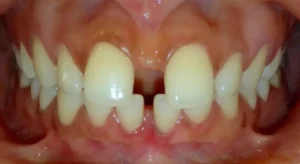Why Do Gums Grow Over Braces?- video
This is a common question posed by patients during braces treatment. There may be several explanations, but generally, this is due to poor hygiene. In this video, Dr. Drut explains how it could happen that your gums grow over your braces.
Keeping Your Gums Healthy is Key!
Your gums are soft tissue that grows around the teeth, helping to hold them in place by the roots. The membrane covering your gums is important to keep your mouth healthy and clean, and protect it from germs and also from injury! Keeping your gums healthy is an important part of good oral hygiene, whether you have braces or not.
Improper care of gums can have unpleasant consequences: pain or inflammation, bleeding, and over time, gum recession and/or gum disease. When gums grow over your braces, it is usually a sign that you are not taking proper care of your gums.
When you get braces put on, you are introducing new appliances to your mouth that create more traps for food and other debris, and that means more places for plaque and bacteria to collect. Brushing twice a day and flossing regularly are key to keeping your mouth clean, and sweeping away any bacteria that collects under your braces, between the wires, around the brackets, etc.
When you don’t brush and floss, there is excessive bacteria growth on your teeth and between your braces. This can cause your gums to swell or become inflamed and irritated; they may bleed, and in some cases, they may be triggered to start growing more gum, which is called hypertrophy or hyperplasia.
If you notice this happening to your gums, don’t panic: it can be easily treated by re-introducing proper oral hygiene habits! If you are concerned or feel pain, you should contact your orthodontist.
If brushing and flossing regularly don’t make a difference, consult your orthodontist: it is also possible that certain medications, as well as pregnancy, could cause your gums to swell. Or, in certain cases, the brackets of your braces could be misaligned, causing irritation to your gums and stimulating unwanted gum growth.
How to Stop Gums From Growing Over Braces
Generally, gum growth or swelling can be treated simply by adjusting your oral hygiene habits.
Be sure to brush with a soft-bristled toothbrush 2/3 times a day with fluoride-fortified toothpaste , for 2 minutes at a time. Floss every day: with braces, you can use a floss threader, as well as a Waterpik or water jet, for maximum effect. We recommend using a fluoride rinse like a mouthwash as well . Want more info? Read up on all the braces homecare tricks !
If your gums bleed while you floss, this is a sign you haven’t been flossing enough. Just continue to floss and brush as normal and your gums will stop bleeding as they adjust.
Healthy gums don’t bleed, swell, or feel inflamed, so once you start sticking to a good oral care routine, you should start to see healthier gums. If pain or growth persists, contact your orthodontist for support.
Healthy gums are key to a healthy mouth : and healthy mouths straighten teeth faster! So for the best results with your braces, keep those gums healthy, pink, and happy.





